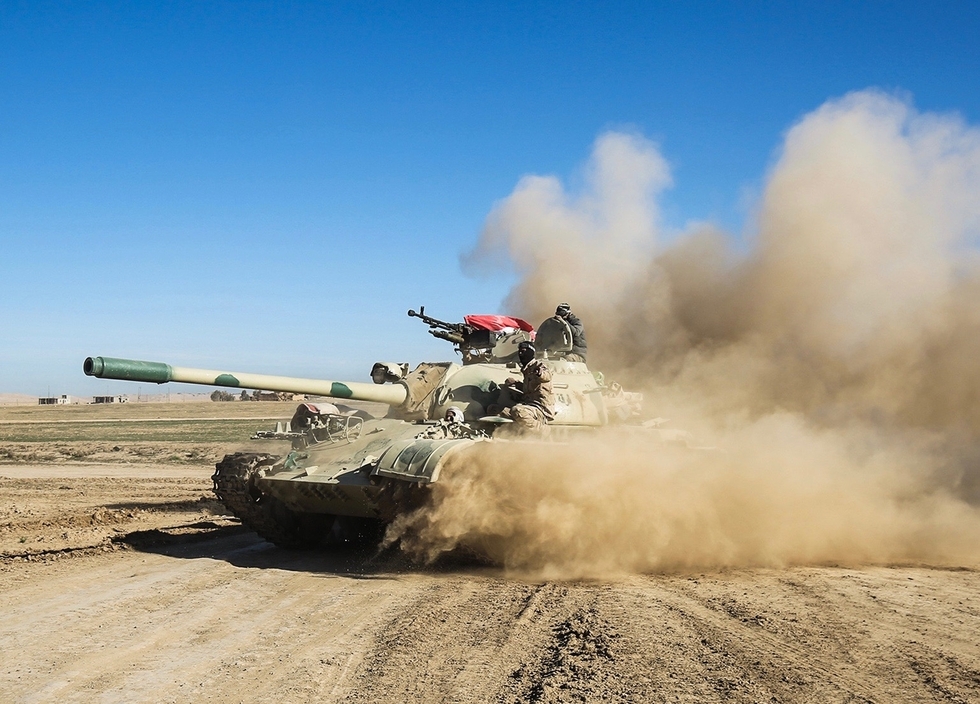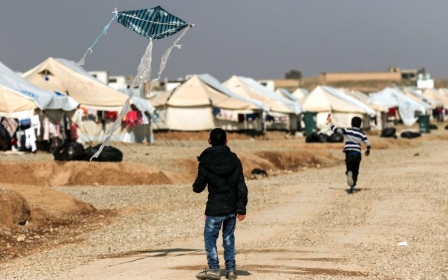Iraq takes villages from IS and nears airport in west Mosul assault

Iraqi forces seized 15 villages from the Islamic State (IS) group on Sunday, launching a daunting operation to retake west Mosul which aid groups warned will put civilians in grave danger.
Advancing from several directions, the forces moved towards Mosul airport just south of the city, marking a new phase in Iraq's largest military operation in years.
IS has put up stiff resistance in defending Mosul, the city where its leader Abu Bakr al-Baghdadi proclaimed a "caliphate" straddling Iraq and Syria in 2014.
A top army commander announced that forces led by federal police units took villages south of Mosul, leaving them within striking distance of the airport. "We are heading towards the airport," said Abbas al-Juburi of the Interior Ministry's elite Rapid Response force.
The sky south of Mosul was black with smoke from air strikes and artillery as thousands of forces in armoured convoys converged on the airport.
They dashed through the villages, reaching Zakrutiya, a hamlet about 5km south of the airport by the end of the day, a statement said, capturing a power distribution station along the way and killing several militants, including snipers.
The Rapid Response force is advancing alongside the federal police and captured several villages, according to an officer, who said they had been largely abandoned by IS.
"They're desperate," Ali, a Rapid Response officer, said in the village of al-Buseif as helicopters flew overhead, tracking the last IS militants attempting to flee.
"They'll try to cause as many losses as possible, because they know they're going to die anyway," his colleague Alaa said.
Popular Mobilisation paramilitary forces also contributed to the advance on Mosul and to the tally of 15 recaptured villages for the day, according to a statement by top army commander Abdulamir Yarallah.
The Iraqi government began the offensive to take back Mosul on 17 October, throwing tens of thousands of men into the long-awaited counter-attack with air and ground support from a US-led coalition fighting IS in Iraq and Syria.
US Defence Secretary Jim Mattis declined to offer details about battle plans when speaking to reporters in the United Arab Emirates.
"The coalition forces are in support of this operation and we will continue ... with the accelerated effort to destroy ISIS," he said, using an acronym for the militant group.
To date, the coalition has conducted more than 10,000 air strikes against IS targets in Iraq and trained and equipped more than 70,000 Iraqi forces, a statement said.
The Joint Operations Command coordinating the fight against IS declared east Mosul "fully liberated" on 24 January.
But it took Iraq's most seasoned forces - the elite Counter-Terrorism Service - more than two months to clear the eastern side of Mosul.
After a pause, federal forces now face what was always billed as the toughest nut to crack: Mosul's west bank, home to the narrow streets of the Old City.
"Mosul would be a tough fight for any army in the world," the commander of the US-led coalition forces, Lieutenant General Stephen Townsend, said in a statement.
"West Mosul had the potential certainly of being more difficult, with house-to-house fighting on a larger and more bloody scale," said Patrick Skinner from the Soufan Group intelligence consultancy.
More than half of the 9,000-plus coalition forces deployed in Iraq are American, and some were visible on the front lines on Sunday.
Recent incidents in the recaptured east point to the difficulty of ensuring IS remnants have not blended in with the civilian population.
Aid organisations had feared an exodus of unprecedented proportions before the start of the Mosul operation, but half a million residents stayed home in east Mosul.
Their continued presence prevented both sides from resorting to deadlier weaponry, which may have slowed down the battle but averted greater displacement and destruction.
The UN is rushing to build more shelters around Mosul ahead of an expected wave of displacement from the city.
"We are racing against the clock to prepare emergency sites south of Mosul to receive displaced families," said the UN's humanitarian coordinator in Iraq, Lise Grande, in a statement.
"The humanitarian operation is already stretched. We are trying to reach more than six million people across Iraq who need help. We don't have all of the funding we need and many partners are facing major capacity constraints," she said.
Residents of west Mosul have reported very difficult living conditions and have warned that they were already low on food, with weeks of fighting expected to lie ahead.
Grande told AFP that, while the Mosul operation is going "better than expected," there are still "serious dangers" lying ahead.
Stay informed with MEE's newsletters
Sign up to get the latest alerts, insights and analysis, starting with Turkey Unpacked
Middle East Eye delivers independent and unrivalled coverage and analysis of the Middle East, North Africa and beyond. To learn more about republishing this content and the associated fees, please fill out this form. More about MEE can be found here.





